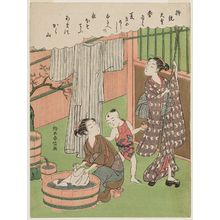鈴木春信による浮世絵「Empress Jitö」
作者:鈴木春信
作品名:Empress Jitö
制作年:1767 - 1768 c.
詳細:詳細情報...
情報源:ホノルル美術館
浮世絵(全 5,476 件)を表示...
説明:
Spring has gone away and summer come, it would seem from those white hemp robes laid to dry in the sunlight on Kagu's Heavenly Hill This poem by Empress Jitö comes from the Ogura Hyakunin Isshu (One Hundred Poems by One Hundred Poets). Compiled by the renowned court poet Fujiwara no Teika (1162-1241), this anthology is a personal selection of one hundred tanka poems which document the changing poetic tradition from the earliest days of the Japanese imperial court (7th century) to Teika's own time (13th century). It comprises representative poems selected from ten imperially commissioned poetry anthologies, arranged historically so that readers can enjoy five centuries of court poetry within one collection. In this clever interpretation by Harunobu, Empress Jito's (r. 690-697) original poem, featured in script above, is juxtaposed with a commonplace scene of a mother and daughter washing and drying their clothes at the beginning of summer, while a young boy vies for the mother's attention. (Feb 2011) ALT TEXT A mother and daughter are busy washing and drying clothes for the seasonal change of wardrobe at the beginning of summer. The young boy is paid no attention as he stands fast by their side, following their every move. The design of the apparatus which draws water from the large bucket into the smaller bucket exemplifies the waterworks of Harunobu’s day. (from “100 Poems, One Poem Each” exhibition, 1/18/2005-) ALT TEXT This print was conserved with the support of the Robert F. Lange Foundation. Spring has gone away and summer come, it would seem from those white hemp robes laid to dry in the sunlight on Kagu's Heavenly Hill (translation by Steven D. Carter) The Ogura Hyakunin Isshu (One Hundred Poems by One Hundred Poets) anthology, compiled by the renowned court poet Fujiwara no Teika (1162-1241), is a personal selection of one hundred tanka poems which document the changing poetic tradition from the earliest days of the Japanese imperial court (7th century) to Teika's own time (13th century). It comprises representative poems selected from ten imperially commissioned poetry anthologies, arranged historically so that readers can enjoy five centuries of court poetry within one collection. Although many people today associate the Hundred Poems with utakaruta, a poem-matching card game commonly played during the Japanese New Year holiday, the anthology originally circulated in text format and was not printed with illustrations until the beginning of the Edo period. Poem-cards conventionally paired poems with pictorial representations of the poets, while ukiyo-e artisans were more daring in their interpretations of these popular poems. In this clever interpretation by Harunobu, Empress Jito's (r. 690-697) original poem, featured in script above, is juxtaposed with a commonplace scene of a mother and daughter washing and drying their clothes at the beginning of summer, while a young boy vies for the mother's attention.
類似の浮世絵

